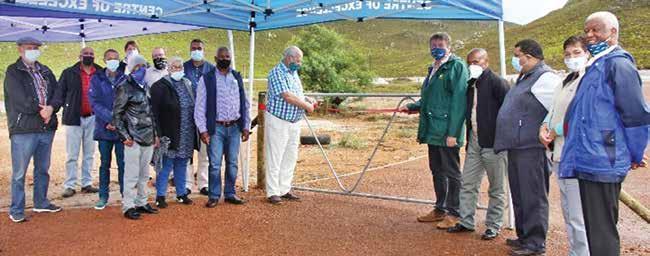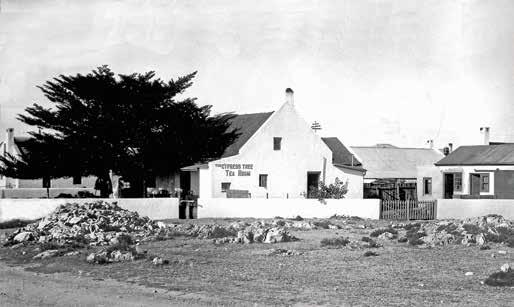3
www.thevillagenews.co.za
24 March 2021
R43 upgrade: comment period now open From P 1 EFG Engineers was appointed by the DTPW to investigate and undertake the necessary planning and design studies for the dualling of Trunk Road 28, Section 1 between Vermont and Sandbaai. As a scope extension, the periodic maintenance of the section between Sandbaai and Hermanus was included in the assignment, aimed at addressing various issues along the R43, such as traffic volumes in the high tourist seasons; pavement capacity constraints; and the provision of non-motorised facilities, public transport facilities and street lighting, and other ancillary works. SLR Consulting was tasked with compiling a draft Basic Assessment Report (BAR) by EFG Engineers on behalf of the
DTPW, who appointed SLR as the independent Environmental Assessment Practitioner (EAP) to undertake the required Application for Environmental Authorisation (EA) and associated Basic Assessment (BA) process for the proposed project. The BAR has been compiled to assess the potential environmental impacts of the proposed project and as a basis to inform Interested and Affected Parties (I&APs) of the proposed project and to obtain their feedback. SLR released the draft BAR for a 30-day public and authority review period from 17 March to 20 April 2021. The full report is available for download at https://www.slrconsulting.com/ public-documents/R43-upgrade and a hard copy is available at the Mount Pleasant Library in Hermanus. For
additional info, contact Candice Sadan on csadan@slrconsulting.com. For comments to be included in the final BAR to be submitted to the Department of Environmental Affairs and Development Planning (DEA&DP) it must reach SLR by no later than 20 April 2021. After the conclusion of the comment period, all comments received will be collated into a Comments and Responses Report and included in the final BAR, which will be prepared for submission to the DEA&DP for consideration of the application. After DEA&DP has reached a decision, all registered I&APs will be notified of the outcome of the application and the reasons for the decision. A statutory Appeal Period in terms of the National Appeal Regulations, 2014 will follow the issuing of the decision.
Overstrand part of new energy project I n his Budget 2021 Address in the Provincial Parliament on 16 March, Western Cape Minister of Finance and Economic Opportunities, David Maynier announced that R48.8 million would be spent over the medium term, and a further R20 million provided in the provincial reserves, for the Municipal Energy Resilience (MER) Project in the Western Cape.
blow that risks compromising economic recovery,” said Maynier.
Overstrand is among the six candidate municipalities participating in the first phase of the MER Project in this financial year, along with the Drakenstein, Mossel Bay, Saldanha Bay, Stellenbosch and Swartland municipalities.
The MER Project is spearheaded by the Green Economy unit at the Department of Economic Development and Tourism, which is working in collaboration with the Department of Local Government and Provincial Treasury to enable the development of energy projects and engage with municipalities on multiple fronts.
“We know that load shedding costs the economy about R75 million per stage, per day in the Western Cape. When it comes to the economy, Covid-19 is a ‘left hook’, and load shedding is a ‘right hook’, which together often results in a knock-out
“Which is why we launched the threeyear MER Project last year to support municipalities to take advantage of the new energy regulations to generate, procure and sell their own power so that we can become more energy secure in the Western Cape.”
Eskom chief operating officer Jan Oberholzer recently announced that South Africans have many more months of load shedding lying ahead, with the country only likely to see an
increase in power reliability towards September. An even graver prediction came from Eskom chief executive André de Ruyter when he warned that the country faces another five years of load shedding due to a shortfall of 4 000MW. This shortfall could be reduced if more municipalities move off Eskom’s grid in favour of other power options. However, Maynier said the procurement of energy at utility and municipal distribution scale, such as bulk energy purchases from Independent Power Producers (IPPs), under conditions of developing and evolving policies and regulations, is a complex and challenging task. “Municipalities may not have the policies, plans, resources, funding, or procurement expertise to procure wholesale electricity from sources other than Eskom, specifically IPPs. Neither have all municipalities’
electricity distribution systems been technically evaluated to clarify their readiness to support new electricity generation and energy trading.”
To identify the candidate municipalities for the MER Project, a readiness evaluation was conducted to determine which municipalities were most equipped, and met the conditions required to take advantage of the energy regulations, to develop their own power generation projects and also procure power from IPPs. “Now that the candidate municipalities have been announced, we will be confirming willingness and commitment through a Memorandum of Understanding, and then working closely with them in the first phase of MER Project to identify pioneering energy projects and develop a roadmap to roll out the projects. “This process will consider multiple
pioneering renewable energy technologies and scales, cost options, scale of investment required, location issues, risks, municipal readiness needs, infrastructure needs, timelines to get capacity onto the grid, transaction and procurement mechanisms and regulatory issues.” Minister Maynier added that any learnings from projects implemented with the candidate municipalities would be applied to future projects in other municipalities. While this project should enable municipalities to buffer residents and businesses from the impacts of load shedding, he said they would still continue to be connected to the national grid as “we won’t be able to meet 100% of energy demand through renewable energy at this stage. The MER Project is just another example of how we are working hard to become more energy resilient in the Western Cape.”




















